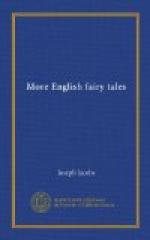LXXI. THE KING OF ENGLAND
Source.—Mr. F. Hindes Groome, In Gypsy Tents, told him by John Roberts, a Welsh gypsy, with a few slight changes and omission of passages insisting upon the gypsy origin of the three helpful brothers.
Parallels.—The king and his three sons are familiar figures in European maerchen. Slavonic parallels are enumerated by Leskien Brugman in their Lithauische Maerchen, notes on No. 11, p. 542. The Sleeping Beauty is of course found in Perrault.
Remarks.—The tale is scarcely a good example for Mr. Hindes Groome’s contention (in Transactions Folk-Lore Congress) for the diffusion of all folk-tales by means of gypsies as colporteurs. This is merely a matter of evidence, and of evidence there is singularly little, though it is indeed curious that one of Campbell’s best equipped informants should turn out to be a gypsy. Even this fact, however, is not too well substantiated.
LXXII. KING JOHN AND THE ABBOT
Source.—“Prosed” from the well-known ballad in Percy. I have changed the first query: What am I worth? Answer: Twenty-nine pence—one less, I ween, than the Lord. This would have sounded somewhat bold in prose.
Parallels.—Vincent of Beauvais has the story, but the English version comes from the German Joe Miller, Pauli’s Schimpf und Ernst, No. lv., p. 46, ed. Oesterley, where see his notes. The question I have omitted exists there, and cannot have “independently arisen.” Pauli was a fifteenth century worthy or unworthy.
Remarks.—Riddles were once on a time serious things to meddle with, as witness Samson and the Sphynx, and other instances duly noted with his customary erudition by Prof. Child in his comments on the ballad, English and Scotch Ballads, i, 403-14.
LXXIII. RUSHEN COATIE
Source.—I have concocted this English, or rather Scotch, Cinderella from the various versions given in Miss Cox’s remarkable collection of 345 variants of Cinderella (Folk-Lore Society, 1892); see Parallels for an enumeration of those occurring in the British Isles. I have used Nos. 1-3, 8-10. I give my composite the title “Rushen Coatie,” to differentiate it from any of the Scotch variants, and for the purposes of a folk-lore experiment. If this book becomes generally used among English-speaking peoples, it may possibly re-introduce this and other tales among the folk. We should be able to trace this re-introduction by the variation in titles. I have done the same with “Nix Nought Nothing,” “Molly Whuppie,” and “Johnny Gloke.”




